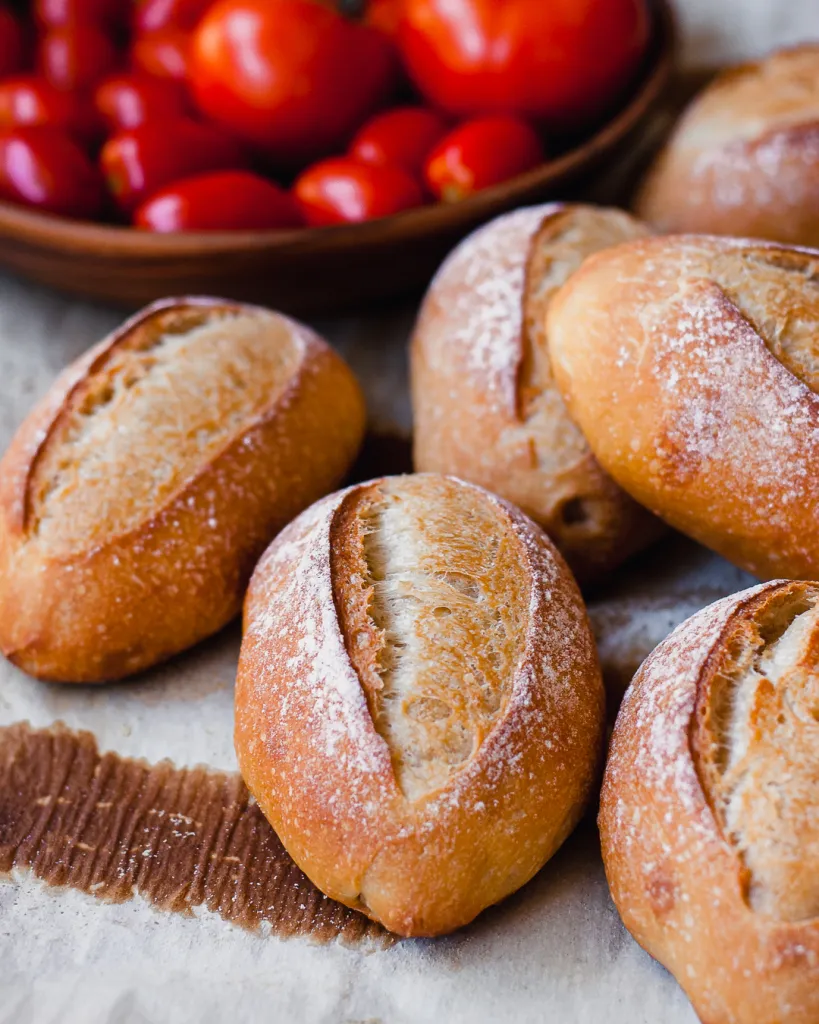Sourdough Italian Rolls

Every so often my kids and I will walk down to our neighborhood Italian bakery. I usually let them pick a treat for the road, and my son almost always walks past the cookies and pastries and chooses a plain, white Italian roll. (Once he did ask for a rum ball. Good thing I asked the cashier what it was before agreeing.) And he absolutely has no problem demolishing the whole thing (they’re probably 6-7 inches long!) in one sitting.
As an avid bread baker, I was determined to make something similar that would garner the same enthusiasm. And this is it! Simple rolls that are crusty-but-not-too-crusty and a soft but chewy crumb. They are naturally leavened, but are very mild and slightly sweet in flavor.
Also, these rolls are a lot of fun to make. The dough is easy to handle, and you can either make them in one day or retard the dough overnight (I’ve noted in the method when to refrigerate the dough if desired.) They are the perfect all-purpose roll: use them for sandwiches, as an accompaniment for soups and stews, or just eat them plain, like my kid. Personally, I like them slightly warm from the oven with some good salted butter.
(By the way, I asked my son why he liked this particular recipe so much, and he explained that it was because the rolls were oval. What can I say? That being said, you can shape this dough any way you want — baking time may need to be adjusted.)

Sourdough Italian Rolls
Makes 8 medium rolls
Ingredients:
For the stiff levain:
- 64g mature 100%-hydration sourdough starter
- 128g bread flour
- 128g AP flour
- 192g water
Combine all ingredients and mix together until smooth. Cover and allow to ferment at room temperature until ripe, 8-12 hours (it should at least double).
For the final dough:
- 224g bread flour
- 64g AP flour
- 32g semolina flour
- 170 g water
- 12g salt
- 14g sugar
- 28g olive oil
- All of the levain
Method:
- Combine all ingredients in the bowl of a stand mixer fitted with a dough hook. Mix on low to combine, then raise the speed to low-medium (3 or 4 on a KitchenAid). Continue mixing until the gluten is moderately developed. The dough should be soft, but not sticky.
- Transfer the dough to an oiled container. Allow to rise at room temperature until doubled, folding every 30 minutes for the first hour. The time it will take to double will depend on how active your starter is and the temperature of your room; mine took about 2.5-3 hours. (Note: if you’d like, you can retard the dough overnight after it’s almost doubled. When you’re ready to bake, allow the dough to rest and come to room temperature for 30-45 minutes after dividing.)
- Turn the dough out onto a lightly floured surface. Divide into 8 equal pieces, about 130g each, and shape into loose rounds. Cover and let rest for 10 minutes. Meanwhile, prepare a large sheet pan with parchment paper and lightly dust with semolina / cornmeal. (Note: I like to double up on baking sheets for these rolls to keep the bottoms from scorching.)
- Shape each round into a batard (oval) and transfer, seam side down, to the prepared baking sheet. For these rolls I like to degas fairly well and shape tightly for a nice, even crumb.
- Lightly mist the rolls with oil and cover. Allow to rise at room temperature until the rolls have increased by about 50% (this takes me about 1.5-2 hours). About an hour before baking, preheat the oven to 500F with a baking stone on the center rack and sheet tray on the bottom of the oven.
- When the rolls are ready to bake, have ready a measuring glass with hot water. Lightly dust the tops of the rolls with rice flour, if desired, and slash the top of each roll down the center with a sharp blade (I like a curved lame for this).
- Transfer the rolls to the oven and carefully pour about 1 cup of hot water into the sheet tray on the bottom of the oven. Bake for 5 minutes, then turn the heat down to 450F and bake for another 15-20 minutes or until the rolls are golden brown and sound hollow when tapped. Transfer to a wire rack to cool.


